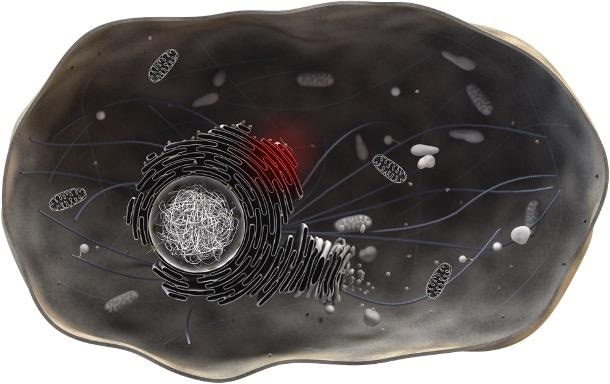There is a wide range of mechanisms related to chemoresistance, a majority of which are yet to be fully understood.

Dissecting the UPR-response with multi-omics approaches, UPR-response is depicted at cellular level red. Image Credit: © Robert Ahrends.
The supposed cellular stress response—a series of genetic programs that allow the cells to endure under stressful conditions—has a major role in chemoresistance and in the development of various diseases.
Hence, a deeper insight into the cellular stress response routes is urgently needed to develop unique therapeutic concepts to resolve chemoresistance.
In this context, we employed comprehensive analytical approaches to gain deep and molecular insight into the Unfolded Protein Response, a cellular stress reaction induced by unfolded proteins.”
Robert Ahrends, Group Leader, Department of Analytical Chemistry, Faculty of Chemistry, University of Vienna
Unfolded proteins cause stress and disease
The Unfolded Protein Response (UPR) is involved in the development and progression of cancer and performs a significant role in a number of diseases, like neurodegenerative disorders and diabetes.
To analyze the molecular biological characteristics of the UPR, the scientists applied advanced analytical tools in the context of a multi-omics method, integrating huge datasets from metabolomics, genetics, and proteomics. This enabled them to characterize the UPR regulon, a complete list of genes that are triggered to support the survival of cells under stress.
Besides the previously known factors, we identified to our surprise numerous genes that have not previously been implicated in stress response pathways, and many of them have key functions in cancer development and cellular metabolism.”
The Researchers, University of Vienna
Changes in 1C metabolism
As already demonstrated by the Nobel Prize winner Otto Warburg in his pioneering work in the 1930s, variations in cellular metabolism are typical in several types of cancers and support the rapid growth of tumors.
During their study, the scientists identified the involvement of stress-mediated genetic regulation of enzymes in one-carbon (1C) metabolism, which depends on the vitamin folate as a cofactor. The stressed cells, which are concomitant to the metabolic re-wiring, turned out to be completely resistant against chemotherapeutic agents, which focus on this particular metabolic pathway.
This comprises Methotrexate, a drug often used for treating rheumatic diseases and cancer. In-depth biochemical and genetic investigations demonstrated that resistance is driven by an earlier unidentified mechanism. According to the authors of the study, its accurate molecular characterization may result in new therapeutic concepts aimed at resolving chemoresistance in cancer treatment.
Source:
Journal reference:
Reich, S., et al. (2020) A multi-omics analysis reveals the unfolded protein response regulon and stress-induced resistance to folate-based antimetabolites. Nature Communications. doi.org/10.1038/s41467-020-16747-y.